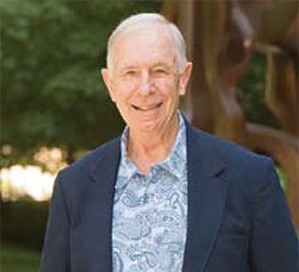
The first time I went to see Frank Maple,” recalls Professor Robert Ortega, “I saw file cabinets stacked on top of each other in his office. I couldn’t imagine what it would take to achieve such a collection, but after reading some of his work, I now know that it’s only a fraction of what he carries in his mind and heart.”
As a young man, Maple dreamed of being a coach or sports writer. He attended the University of Michigan, earning a master’s degree in education. He realized both dreams when he taught history and coached basketball and baseball at a local high school and then became a sports writer in Elmira, New York.
“Believe it or not, the skills I acquired while coaching and working as a sports writer were invaluable and prepared me for my future social work experiences,” says Maple. “As a coach, I learned to teach performance skills; and as a sports writer, I learned to observe and describe the behaviors of successful athletes.”
How did this high school teacher and coach transition to social work? Each year, more and more aggressive boys were assigned to Maple’s classes. While seeking resources to assist these boys, he was referred to the school social worker. Their meeting led him to realize that it was this kind of work he really wanted to do.
After taking classes at the U-M SSW, Maple became a high school social worker himself for five years. Requesting advice of Professor Robert Vinter regarding working with groups, Maple decided to finish his MSW and was offered a faculty position at the School. He remained for 41 years, a faculty record, before his retirement in 2003.
While at the School, Maple had another chance meeting that would again transform his work. Cindy Kleinsmith, a student in an interpersonal practice class, proposed that he turn his book Shared Decision Making into software programs on individual, group, and family therapy. This resource would allow social work students to engage in more active learning experiences by choosing from four different interventions at various points in a transcript of a treatment session.
“I found this program to be an important educational tool because it required active involvement of students,” says Maple. “They had to really participate in selecting treatment interventions. In addition, it allowed the students to learn at their own pace in complete privacy.”
While this new program was innovative, Maple soon found that students wanted to see and hear clients. Maple teamed up with David Starks from the University’s Office of Institutional Technology to create five interactive videos on interviewing, group work, and family therapy. Maple’s research on the learning outcomes of these students found high levels of satisfaction among the participants.
Former student Nicole LaLonde (MSW ’03) considers Maple’s clinical class to be one of the best she took. “We actually worked on therapy techniques that were applicable and relevant. This was real clinical experience. Now that I am in the field working, I have used a lot of these techniques. I found Professor Maple to be honest, available, and easy to talk to. He was truly a mentor for me during my time at the School.”
After retiring, Maple realized that he missed his interactions with students at the School, so he returned to teach two sections of Interpersonal Practice with Individuals, Families, and Groups. In addition to his teaching, he has kept busy traveling and continuing his involvement in sports.
It seems that Maple has passed on his dedication for the profession not only to students within the School, but also to many of his own family members. His daughter became a school social worker, and one son-in-law and two granddaughters have also entered the field.
Maple has high hopes for the U-M SSW. “I hope that we will continue to graduate students who have achieved a high level of competency in relation to their delivery of social work services. The greatest challenge for them will be the ability to draw upon their knowledge and understanding when they are faced with circumstances for which they have no direct experience.”
—Amanda S. Apostol is a member of the Dean’s office staff.